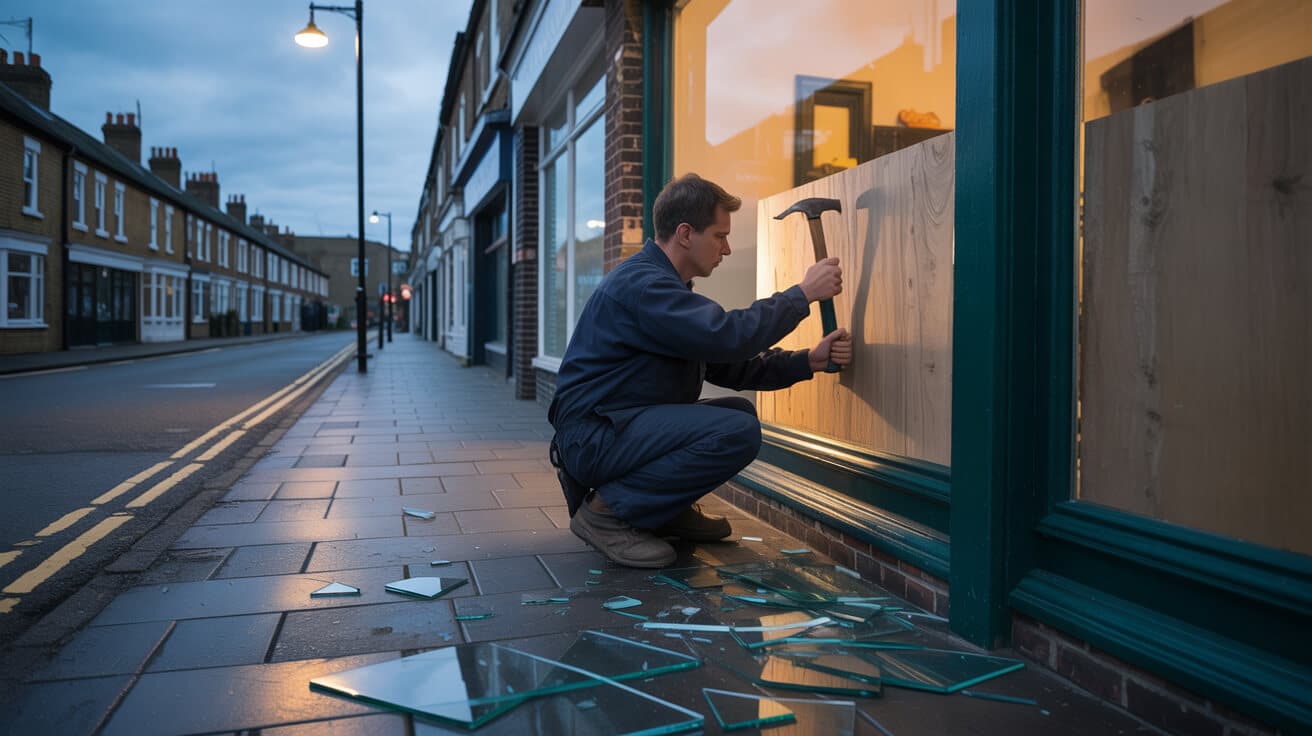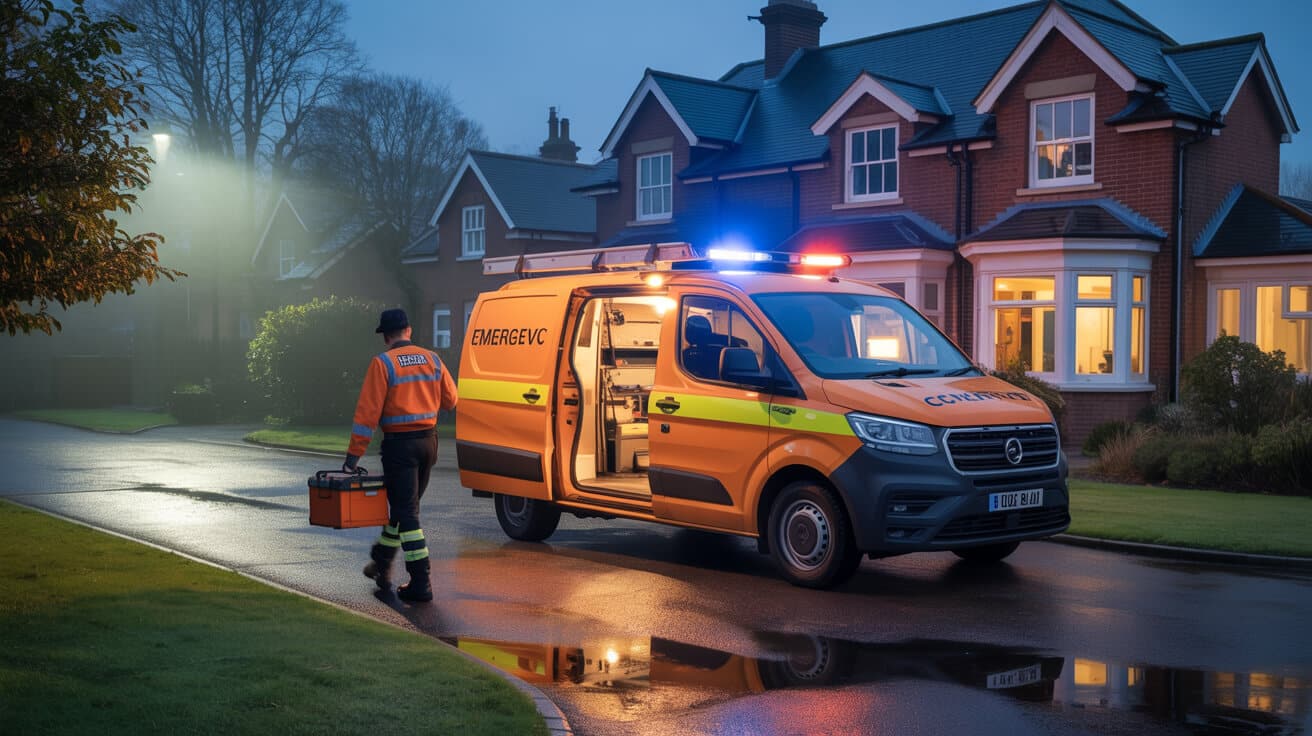 Emergency Repairs 101 What To Do When Things Go Wrong
Emergency Repairs 101 What To Do When Things Go Wrong

What Really Counts as an Emergency—and Why Delaying Can Cost More Than You Think
Emergencies don’t always start with chaos—they often begin with a whisper: a faint drip, a small stain, a flickering bulb. But scratch beneath the surface, and you’ll find that recognising what’s urgent and what can wait isn’t just common sense—it’s the difference between quick, manageable action and spiralling costs or legal trouble.
If you’re responsible for a property—whether you own, manage, or live there—mastering the signals matters. The UK’s legal and practical definitions are clear:
- Emergency: = A situation where *safety, habitability, or critical services are at immediate risk*.
- Sudden loss of water, power, or heating (especially in extreme weather).
- Significant water escapage, major leaks, or suspected gas leaks.
- Major electrical faults—sparks, burnt smells, visible smoke.
- compromised security, such as forced entry or broken external locks.
It isn’t just about inconvenience. Delay amplifies risk,–turning a quick fix into structural damage, lost rent, lost tenants, or even claims against your insurance. Under Section 11 of the Landlord and Tenant Act 1985, the duty to keep vital services running and property safe isn’t a “nice to have”—it’s an enforceable obligation (Shelter).
An ignored leak or minor electrical fault can go from background noise to a legal emergency in days.
If you see something you wouldn’t ignore at home, do not leave it lurking in your investment, flat, or managed space. Emergencies that go unaddressed can void insurance and expose you to claims from landlords, tenants, or contractors. The real cost is rarely just the invoice—it’s disruption, liability, and reputation.
Should You Attempt to Stabilise Water, Power, or Gas—Or Just Wait for Help?

Panic makes mistakes—but a calm, systematic first move keeps a situation from collapsing into a disaster. Begin here: contain the risk, but do not take on repairs that demand a certificate or legal competence.
- Water issues: Immediately isolate the stopcock (usually found under the kitchen sink, in a utility cupboard, or sometimes by the front door). Turn it clockwise. Teach everyone in a property to locate it.
- Electric faults: At the consumer unit (fuse box), turn off the affected circuit(s)—but only if dry and safe. Never touch electrical installations in damp or burning conditions.
- Gas smells: Evacuate, do not use any switches or phones inside, and immediately call 0800 111 999 from outside.
Homeserve recommend always shutting off the water at its point of entry to contain further damage ([Homeserve Guide](https://www.homeserve.co.uk/insurance-cover/plumbing-and-drainage-comparison/plumbing-advice/how-to-fix-a-burst-pipe?utm_source=openai)).
Remember—the goal is containment, not repair. Attempting to trace a live gas or electrical fault yourself can breach your insurance, put people in danger, and risk compliance action.
After you’ve made things safe, bring in accredited expertise—ASAP.
What Quick Actions Help Prevent Catastrophic Damage Before Pros Arrive?

Not every problem lets you just “wait it out”. After making the area safe, the choices you make in the next few minutes can be the difference between a simple fix and months of remediation:
- Place towels, waterproof sheets, or buckets to control water and shield electrics or lower levels from exposure.
- Move valuables, appliances, and any porous or soft items out of the affected area.
- If a leak is large, and it’s safe, open unaffected taps to help release pressure.
- Cordon off the area: *keep tenants, staff, pets, and children away from danger*.
Insurance payouts can be slashed if preventable damages aren’t reasonably contained. ([Insurance Very Good UK](https://insuranceverygooduk.com/is-home-emergency-cover-worth-it-analysing-the-value-for-uk-homeowners/?utm_source=openai))
What not to do?
- Don’t open walls, attempt circuit resets, or disconnect gas appliances unless qualified.
- Don’t improvise with DIY “fixes” that might destroy evidence or make later investigation harder.
Move fast on what you can control—contain, isolate, document—then leave the technical work to someone with credentials. Even moving items or keeping a record counts as protecting your financial position.
Why Thorough Documentation Protects You From Disputes and Denied Claims

When things go wrong, it’s easy for paperwork to drop down the priority list. But the right documentation, collected immediately, is your shield against loss, disputes, and denied insurance claims. Legal compliance and proof of reasonable action both start here:
- Notify your agent, landlord, or insurer by phone immediately, but always follow up with written or digital confirmation (email, repair portal, even a text in a pinch).
- Snap clear, timestamped photos and brief videos of the problem, any steps you took, and items you protected, moved, or isolated.
- Log all communications, receipts, and costs. Create a digital record.
Your smartphone is your best tool. Photos and message trails resolve 90% of disputes before they escalate.
Documentation isn’t bureaucracy—it’s leverage. Nearly all insurance and tenancy contracts require “immediate written notice” to trigger an emergency response or a payout (Citizens Advice).
Delaying this or relying on only verbal notice often means smaller settlements—or worse, claims denied outright.
Who Actually Pays For Emergency Repairs—And How You Avoid Unpleasant Surprises

Emergencies are stressful. Cost confusion adds insult to injury. But the rules are clearer than most realise:
– Landlords: Responsible for structure, water, heating, electrics, basic services.
– Tenants: Only pay if the fault was due to neglect or misuse (the archetype: flushing wipes down a drain, deliberate breakage).
Common “grey areas”:
- Drain blockages: Who pays? Only proven tenant misuse sticks a tenant with the bill.
- Damage from natural wear, weather, or faulty installation: Always on the landlord.
- boiler fails: Landlord, unless missed service appointments or clear fault by tenant is documented.
| Repair Type | Typical Cost (£) | Who Pays? |
|---|---|---|
| Burst pipe | 120–300 | Landlord (unless misuse) |
| Blocked drain | 80–150 | Tenant (misuse only) |
| Boiler callout | 100–500+ | Landlord (tenant only if neglect) |
Landlords must cover core services unless tenant negligence is proven. ([Legal Documents UK](https://www.legaldocuments.co.uk/landlord-and-tenant-law/emergency-repairs-for-landlords/?utm_source=openai))
Never pay large or unclear bills without proper breakdowns and proof. Ask for credentials—DBS, Gas Safe, NICEIC—before approving work. When in doubt, call Shelter or Citizens Advice. Trustworthy suppliers will happily clarify—those that don’t, raise red flags (Checkatrade).
How Documentation and Process Defend Your Legal and Financial Standing

Proof beats promises every time. If you want to protect your wallet and reputation, document every step:
- Have your lease or tenancy agreement to hand—know what counts as an emergency, who’s responsible, and what reporting steps to follow.
- After every incident, retain all emails, photos, receipts, and notes—even after problems are fixed.
- Get written confirmation of works, costs, and origins. Know exactly what was done, by whom, and why.
Courts can order repairs, award compensation, or even fine if statutory duties are ignored. ([Shelter: Section 11](https://england.shelter.org.uk/professional_resources/legal/housing_conditions/responsibility_for_repairs/repairs_under_section_11/?utm_source=openai))
If your landlord or agent is unresponsive, tenants have the right to address hazards themselves and deduct the costs—but you must provide written notice, document everything, and stick to reasonable, evidence-backed spends. Miss a step and you could lose reimbursement, or accidentally take on liability.
It’s a system built for order, not hope. Master the steps and you build durable trust with insurers, stakeholders, and tenants.
When Should You Escalate—and How Do You Choose Emergency Help You Can Trust?

There are moments for patience, and moments for decisive escalation. If safety, habitability, or key services are threatened, or if professional help can’t be contacted promptly, escalate immediately:
- Don’t gamble on unknowns: Choose only accredited, traceable emergency engineers. Gas? Ask for Gas Safe number. Electrics? NICEIC. All techs should carry and display valid ID and clearance.
- Don’t let crisis cloud judgement: Get a written confirmation of call-out fees *before* any work starts.
- Be evidence-obsessed: Photograph the fault, the tradesperson’s ID, and their vehicle for your records—and always request a receipt with specific breakdown.
- Prefer recommended or well-reviewed companies.: Reputable firms build trust off transparency, not urgency.
All Services 4U and Homeserve operate 24/7, with transparent emergency coverage and upfront costings. ([Homeserve](https://www.homeserve.co.uk/insurance-cover/plumbing-and-drainage-comparison/plumbing-advice/how-to-fix-a-burst-pipe?utm_source=openai))
As soon as work is underway or completed, update your landlord/agent with all facts, photos, and paperwork. The result? No drama later—and smooth insurance claims.
Guard your energy for real emergencies. Vet your emergency option before you ever need it.
Why All Services 4U Is the Trusted Emergency Repair Partner

Emergencies aren’t polite—they strike at the wrong hour, on holidays, in the middle of everything. That’s why All Services 4U goes beyond “24/7 lines”—you get the real deal: certified, multi-trade experts on hand, transparent up-front costs, and documentation ready for insurers or your property portfolio.
- True 365/24/7 coverage, not just a phone answerer.
- Staff are DBS-checked, accredited, properly ID’d, and matched to the job—no generic handymen (see [All Services 4U](https://www.allservices4u.co.uk/)).
- No “surprise” fees; everything documented before and after repair.
- Every step is digitally logged, photo-verified, and tied to your records for bulletproof insurance or tenancy compliance.
- Our feedback loops in hundreds of landlord, agency, and tenant testimonials, giving you confidence it’ll get handled right ([Trustpilot](https://www.trustpilot.com/review/allservices4u.co.uk)).
When the pressure’s on, clarity and professionalism protect your future—not a rushed call and a half-written invoice.
With All Services 4U, you’re protected, documented, and always in the loop—so you can sleep at 2am or sit in a boardroom knowing emergencies are handled, not just patched up.
The Proactive Blueprint: How Smart Property Managers Routinely Win in Emergencies
Here’s what separates disaster from recovery: Proactive owners and managers are already ready. The blueprint isn’t secret:
- Pinpoint and label all critical shut-offs in every property—stopcock, fuse boxes, boilers, gas metres. Share maps or simple guides.
- Make documentation habitual. Every incident gets a photo, a note, a sent email. Not just crisis improvisation, but standard routine.
- Hire only professionals for safety or code-sensitive work. DIY saves nothing if it triggers bigger problems or voids compliance.
- Distribute “what counts as an emergency” lists and reporting steps. Don’t leave it to chance or oral tradition.
- Share basic training with everyone who touches your asset: family, staff, or tenants. Knowledge sets the baseline.
- Vet and pre-load contacts for certified emergency trades—so you’re not googling under pressure.
The real disaster isn’t what happens, but being unprepared for it. Document, delegate, and check your team or household knows their role.
Confidence isn’t born in a crisis—it’s built long before, from process, trusted vendors, and clarity in responsibilities.
The Next Step: Secure, Documented Repairs—Any Time, Any Property
Emergencies test your preparation and your partnerships. With All Services 4U, you get more than a fix—you get a proactive, reputation-protecting solution.
Rapid response, transparent costing, watertight documentation—no matter if it’s a tenanted flat, a busy shop, or a portfolio of commercial lets.
A single call connects you to certified, trusted specialists who know the difference between patchwork and permanent solutions. Your safety, assets, and reputation aren’t negotiable. Add our number to your contact list. Share it with your team. And sleep peacefully knowing, when the day goes sideways, your response will be fast, compliant, and calm—every single time.
Choose All Services 4U—the professionals with your back before, during, and after every emergency.
Frequently Asked Questions
What qualifies as a true emergency repair in UK property, and how can you quickly recognise the tell-tale signs?
A property emergency is any event that puts safety, security, or basic functioning at immediate risk, requiring urgent professional intervention to prevent escalation or legal trouble. The hallmark is simple: genuine emergencies threaten either wellbeing (gas leaks, exposed electrics, major flooding), security (broken main doors, failed locks), or habitability (complete loss of heat or power, blocked sole bathroom) in a way that can’t wait for routine scheduling.
It’s the impact on daily living and legal compliance that separates emergencies from nuisances. A dripping tap, a missing fence panel, or a temperamental thermostat is frustrating, but won’t harm a resident or violate regulations if left till the next workday. Suddenly losing all power, finding carbon monoxide sounding, or seeing water pouring from a ceiling are textbook emergencies—all demand an immediate, documented response.
Emergency isn’t just about panic—it’s about anything that could change someone’s life or safety in the next 60 minutes.
How do professionals separate urgent from emergency repairs?
- Health or safety is at risk: Gas leaks, electrical faults near water, or rising water levels anywhere inside always need swift action.
- Security breach: Main doors or windows that can’t be locked, or broken access control.
- No functioning essentials: Total loss of water, heat, or power, especially with vulnerable tenants involved.
- Uninhabitable conditions: Severe roof leaks or anything that exposes the property to weather or pests.
A single blocked toilet for a household? Emergency. All heating gone in mid-winter? Emergency. Minor plumbing leaks, cracked tiles, or loss of a single light socket? Mark as urgent, not emergency—and plan next steps appropriately.
What actions should you take in the critical minutes after discovering a burst pipe, gas leak, or electrical hazard?
Your first five minutes are about risk containment—not repairs. Fast, clear decision-making halts cascading damage, keeps tenants safe, and lays the groundwork for insurance or legal protection.
Immediate steps every property manager or owner should know
- Shut off the source: For water, locate and turn off the stopcock (usually beneath the sink or in an airing cupboard). For gas, close the main valve—typically by the metre. For electricity, isolate power at the mains if water enters wiring or appliances.
- Evacuate if needed: Where you smell gas, hear hissing, see sparking, or spot heavy smoke, get everyone out and keep doors open for ventilation. Locking doors behind you is key if the property still has power.
- Prevent secondary damage: Move valuable items out of the affected area and use towels, buckets, or sheeting to slow the spread of water or debris.
- Don’t touch what you don’t know: Avoid standing water near electrics or experimenting with tools unless you’re certified.
- Collect evidence: Snap timestamped photos and short videos from the start. Record a running commentary if possible—it’s gold for future claims.
- Alert the right professionals: Dial emergency services for hazards like gas leaks, major leaks, or threats to life. Notify All Services 4U for everything else that needs skilled triage.
In the haze of an emergency, step-by-step action beats intuition—every correct move now saves hours, money, and heartache later.
What risky mistakes should you absolutely avoid during property emergencies?
- Don’t attempt repairs of gas or electrics if unqualified; stop at making it safe and reporting.
- Don’t “wait and see” with water that’s spreading or electrics that are buzzing—these get exponentially worse, fast.
- Don’t let panic replace process; following a clear checklist means you protect everyone and avoid insurance exclusions.
How is liability for emergency repairs assigned under UK law, and what must you document to cover yourself?
In UK property, emergency repair responsibilities fall squarely on landlords and property owners for the basic structure, utilities, and safety features. The Landlord and Tenant Act 1985, alongside the Defective Premises Act 1972, leaves little ambiguity—failure to act promptly on emergencies like leaks, failed heating, or secure access can draw regulatory intervention, council orders, and serious fines.
Occupants aren’t off the hook. Tenants must report any emergency quickly and in clear writing (email or text counts as notice), permit repairs, and take all reasonable steps to limit further damage—this could be moving belongings, shutting off water, or blocking a draught temporarily. If delays or new damage occur because tenants failed in these duties, they can be held liable for part or all of the repair.
Your ability to prove the timeline—action taken and notices given—matters just as much as the fix itself. In emergencies, legal records are as important as plumbing tools.
Who does what during emergency response?
| Emergency Type | Landlord/Owner Obligations | Tenant Duties | Agents/FMs |
|---|---|---|---|
| Water/gas/leak/fault | Arrange swift, documented fix | Notify, limit spread, permit access | Triage/comms, track status |
| Lockout/security | Restore secure access ASAP | Notify, do not attempt forced entry | Arrange or dispatch contractor |
| Temporary fixes | Authorise if safety at stake | May undertake minor safe action | Track, report to owner |
| Insurance claims | Provide invoices, pay for repair | Cooperate with adjusters | Gather records, submit claim |
How can you maximise insurance claim success for emergency repairs, and what new pitfalls do insurers watch for?
Insurance coverage hinges on the cause and the evidence you present—not every emergency gets an automatic payout, and new insurer policies are narrowing the net every year. Most mainstream property and landlord policies will pay for sudden, accidental events: a failed pipe, storm-damaged roof, or criminal break-in. Problems from slow neglect, repeated “minor” leaks never reported, or unqualified repairs often hit a wall with loss adjusters.
Recently, more policies specify Home Emergency Cover as a bolt-on—covering callout fees and even temporary accommodation. Look for exclusions like ageing boilers, flat or green roofs, DIY-affected parts, and pre-existing issues to avoid surprises.
How do you build an “insurance-proof” case?
- Save immediate evidence: Time-stamped photos, ongoing video, and even WhatsApp or email trails.
- Secure pro invoices: Only VAT invoices from qualified, insured providers move claims forward quickly.
- Prove containment: Show “reasonable steps” you took to prevent spread or secondary loss.
- Never delay notification: Contact both your insurer and your maintenance pros at the first sign—delays are the number one claim killer.
Insurers want to see that you didn’t cause further damage by waiting or experimenting—the date on your first email is as critical as the receipt for the repair.
What new trends can block your pay-out?
- Smart home monitoring now picks up evidence of previous faults—omitted in a claim, this can void policy.
- More insurers are using digital chat logs and call records to test your timeline and response accuracy.
- Landlords failing to provide maintenance logs may lose not just the claim, but cover for future events.
When is a DIY fix allowed in emergencies, and which actions now legally require a certified UK professional?
The urge to “just fix it” is strong—but UK law draws the line for everyone’s protection. You can always take pre-repair, risk-limiting steps: shutting off mains, mopping water, temporarily boarding a window, or moving belongings. Changing a plug fuse or replacing a bulb is fine, too. What crosses the line? Anything that requires accessing or modifying wiring, opening a gas appliance, removing boiler covers, or making structural changes. Only certified, competent operatives—GasSafe for gas, NICEIC for electrics, FENSA for some glazing—should handle these jobs.
Working outside those boundaries doesn’t just risk safety. It’s also a deal-breaker for insurance, and legally, exposes you and your business to prosecution if someone later gets hurt or the fix fails.
Contain, record, inform, then hand off: stepping outside that chain puts your asset—and your future—in someone else’s hands.
Owner, Tenant, or Pro? Who’s allowed to do what?
| Task | Tenant/Owner | Certified Pro Required |
|---|---|---|
| Stopping a leak (main valve) | Yes | No |
| Replacing bulbs, fuses | Yes | No |
| Emergency boarding/glazing | Temporary/safe only | Yes, for complete/structural |
| Fixing wiring/boilers/gas | No | Yes |
| Making structural repairs | No | Yes |
Always default to professional help—especially with electrics or gas. Even if cost or inconvenience seem urgent, the penalty for dangerous shortcuts is far higher than waiting for All Services 4U’s expert team.
What are the overlooked costs and reputational risks of slow or incomplete emergency repairs for UK property owners and managers?
Delays amplify harm—it’s not just about fixing a specific leak or fault. Letting water travel unchecked even for hours can rot floor joists, spread damp, and damage electrics, multiplying future costs. Missed or late intervention can expose you to blame for tenant loss, health impacts (black mould, fire risk, cold exposure), and breach of contract or regulation—triggering withheld rent, deposit forfeits, or even legal action via the council.
In commercial or multi-unit settings, one ignored incident can disrupt business, force closure (HSE), or prompt insurance denial for every unit affected. For reputationally-minded owners, every well-managed emergency becomes a trust signal; each fumble can be documented online by tenants or in official audits.
Show the market you’re proactive, not reactive—your first response to emergencies is a calling card for future partners and tenants.
Why does using an expert like All Services 4U keep your property, records, and compliance future-proofed?
- 24/7 response lines, so you’re never left fielding calls alone at 2am
- Multi-trade, safety-vetted technicians able to resolve issues in one visit—minimising disruption and risk
- Immediate digital documentation for both you and your insurer—speeding up claims and protecting value
- Robust compliance to all UK codes: BS7671, Gas Safe, HSE, EPA, and current local rules
Taking decisive, documented action upgrades your legal standing, protects everyone in your building, and cements your status as a best-in-class operator. When every hour counts, All Services 4U stands ready as your front line between chaos and calm.



